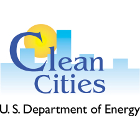
The mission of the Clean Cities program is to advance the nation’s economic, environmental, and energy security by supporting local decisions to adopt practices that contribute to the reduction of petroleum consumption. Clean Cities carries out this mission through a network of more than 85 volunteer coalitions, which develop public/private partnerships to promote alternative fuels and vehicles, fuel blends, fuel economy, hybrid vehicles, and idle reduction.
The medium- and heavy-duty vehicle industry is changing rapidly with fleets adopting alternative fuels and advanced technologies to reduce petroleum use and comply with the 2010 U.S. Environmental Protection Agency (EPA) and California Air Resources Board (CARB) emission standards. Clean Cities has long maintained its Heavy-Duty Vehicle Search on the Alternative Fuels and Advanced Vehicles Data Center (AFDC) Web site. This guide brings together an overview of alternative fuel power sources, including engines, microturbines, and fuel cells, and hybrid propulsion systems along with chassis compatible with the systems. The second half of the guide provides a brief overview of individual medium- and heavy-duty vehicles listed by application. We hope this guide will be helpful to public and private fleet managers who are searching for answers to reduce petroleum consumption and vehicle emissions.
Vehicle information was collected from multiple sources, including original equipment manufacturer (OEM) Web sites, conversion companies, and product literature. Diligent effort was made to contact all manufacturers offering commercially available vehicles with alternative fuel or advanced technology options. However, there may be omissions or product changes since publication. Check the AFDC’s heavy-duty vehicle information at www.afdc.energy.gov/afdc/vehicles/search/heavy for the most current information. Manufacturers are also invited to add or correct any information by contacting the AFDC Webmaster at www.afdc.energy.gov/afdc/progs/webmaster.php.
Heavy-duty vehicle application overview
School Bus: Compressed natural gas (CNG) and propane are popular alternatives to gasoline and diesel fuel for school buses. Hybrid electric buses and plug-in electric hybrids are also available.
Shuttle Bus: CNG, propane, hybrid electric power, and fuel cells are potential power sources for shuttle buses and large passenger vehicles that provide transportation on standard routes.
Transit Bus: Hybrid-powered transit buses, along with CNG and liquefied natural gas (LNG), are available. Fuel cell demonstrations are also in progress.
Refuse Truck: CNG-fueled vehicles are available, and some can use biomethane produced from landfill gas. Standard routes and stop-and-go operation make refuse haulers a good application for hybrid operation. Hydraulic hybrid systems are well suited to refuse service.
Tractor: Diesel electric hybrids offer fuel-saving hybrid operation with the convenient availability of diesel. CNG and LNG operation are also available in some models.
Van: Step vans that service a set route, such as a package delivery service, may find all-electric battery operation an effective, low-polluting alternative. CNG and propane operation are also popular alternatives.
Vocational Truck: CNG, propane, all-electric, and hybrid vehicles operate in a variety of roles from beverage delivery to utility boom truck, paint striping truck, and merchandise delivery.